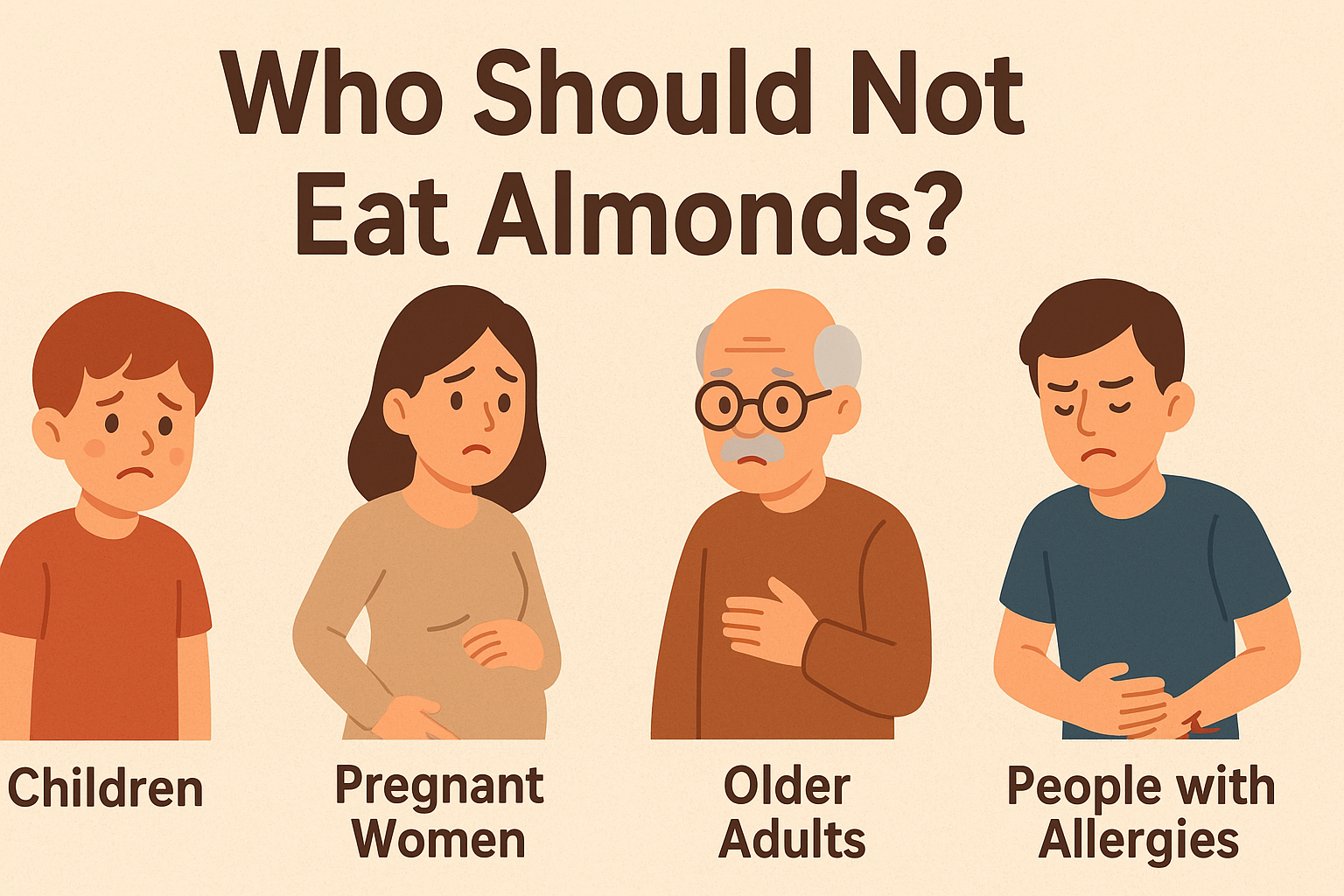In earlier articles, we discussed the benefits of almonds and their dosage, but in this article, we provide information about who should not eat almonds.
Almonds are one of the most beloved superfoods worldwide. From boosting energy to supporting heart health, they are packed with vitamins, minerals, protein, and healthy fats. For most people, eating a handful of almonds daily is a simple way to enhance overall health.
But here’s something many people don’t realise — almonds are not suitable for everyone. Yes, they are healthy, but certain groups of people should avoid them or eat them only in moderation. If you’re wondering “Who should not eat almonds?”, this guide will walk you through everything you need to know.
Also Read: Are almonds good for health?
Table of Contents
1. People with Nut Allergies
The most obvious group that must avoid almonds are people with tree nut allergies. Symptoms can range from mild itching and rashes to severe reactions like swelling of the throat or difficulty breathing. In some cases, it can even be life-threatening.
👉 If you know you have a nut allergy, almonds should be completely avoided.
2. Those Prone to Kidney Stones
Almonds are rich in oxalates, which can contribute to the formation of calcium oxalate kidney stones. For individuals who have a history of kidney stones, eating too many almonds may increase the risk.
👉 Doctors often recommend limiting almond intake or switching to low-oxalate nuts like macadamias.
3. People with Sensitive Digestive Systems
Almonds are high in fibre, which is great for gut health in moderation. But for those with conditions like IBS (Irritable Bowel Syndrome), gastritis, or a sensitive stomach, excess almonds can cause:
- Bloating
- Gas
- Constipation
So if you notice digestive discomfort after eating almonds, it might be best to cut down.
4. Children Under 3 Years Old
Whole almonds can be a choking hazard for toddlers. For young children, almonds should only be given in safe forms such as:
- Almond powder mixed with milk
- Almond butter
- Almond paste
This way, kids can enjoy the nutritional benefits without any risk.
5. People on Certain Medications
Almonds are naturally rich in vitamin E. While this is usually beneficial, too much vitamin E can interfere with medications — especially blood thinners like aspirin and warfarin. This can increase the risk of bleeding.
👉 If you are on medication, it’s always best to consult your doctor before adding almonds to your daily diet.
6. People Watching Their Weight Too Closely
Almonds are calorie-dense. A small handful (about 23 almonds) contains around 160 calories. While they actually support weight management when eaten smartly, overeating them can lead to unwanted calorie surplus and weight gain.
👉 Moderation is the key. Stick to 20–25 almonds a day.
So, Should You Stop Eating Almonds?
For most healthy adults, almonds are perfectly safe and incredibly beneficial when eaten in moderation. The groups mentioned above should either avoid them or eat carefully under medical guidance.
Remember this simple rule:
✔️ If you have no allergies, no kidney issues, and no medical restrictions, almonds are your friend.
❌ But if you belong to the above categories, you need to be mindful.
Final Thoughts
Almonds are nature’s little powerhouse of nutrition. They boost heart health, sharpen the brain, and support overall wellness. But like every food, they are not for everyone. If you belong to the groups that should avoid them, there are plenty of other nuts and seeds that can provide similar benefits.
👉 The bottom line: Know your body, listen to it, and snack wisely.
Must Read: Almonds Nutrition Facts

Related Posts
Benefits of Walnuts: Why This Powerful Nut Deserves a Place in Your Daily Diet
Walnut Nutrition Facts Per 100 Grams: The Complete Guide
How Many Cashews to Eat Per Day For Weight loss? Benefits for Weight Loss, Pregnancy & Hair Health
How Many Cashew Nuts to Eat Per Day? Health Benefits & Calories Explained